Configure IdP-Initiated SSO for OneLogin
Note
If your organization is using the Portfolio Financials and Capital Planning products in Procore, you will need to reach out to your Procore point of contact or the Support team to set up your OneLogin SSO.
Objective
To configure Procore-initiated SSO for OneLogin.
Background
If your company wants to configure Single Sign-On with OneLogin, you can leverage one of Procore's supported SSO solutions:
- Identity Provider Initiated (IdP-initiated) SSO. With this option, your end users must log into your Identity Provider's SSO page (e.g., OneLogin) and then click an icon to log into and open the Procore web application. To configure this solution, see the Steps below.
OR - Service Provider Initiated (SP-initiated) SSO. Referred to as Procore-initiated SSO, this option gives your end users the ability to sign into the Procore Login page and then sends an authorization request to the IdP. Once the IdP authenticates the user's identify, the user is logged into Procore. To configure this solution, see Configure Procore-Initiated SSO.
Things to Consider
- Required Permissions:
- Administrator permission to OneLogin.
AND - 'Admin' level permissions to Procore's Company level Admin tool.
- Administrator permission to OneLogin.
- Prerequisites:
- Ensure that you have added your Procore users to OneLogin, For step-by-step instructions, please visit the OneLogin Help Center.
- Important! Your users must also be added to Procore's Company Directory (see Add a User Account to the Company Directory or Add a User Account to the Project Directory). Each user's email address for Procore must exactly match their email address for OneLogin.
- Supported Authentication Protocol:
- Security Assertion Markup Language (SAML 2.0)
Steps
Complete these steps:
- Step 1: Add the Procore App to OneLogin
- Step 2: Configure Procore with the SSO Settings from OneLogin
Step 1: Add the Procore App to OneLogin
- Log in to your organization's OneLogin portal using an account that has been granted Administrator permission.
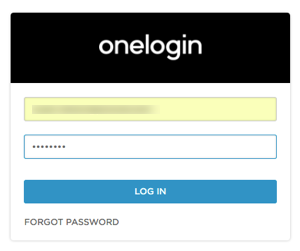
- Click Administration.

- Choose Apps > Add Apps.

This reveals the Find Applications page. - At the Find Applications page, type: Procore
The Procore app will appear.

- Click the Procore app.
This reveals the Configuration page.
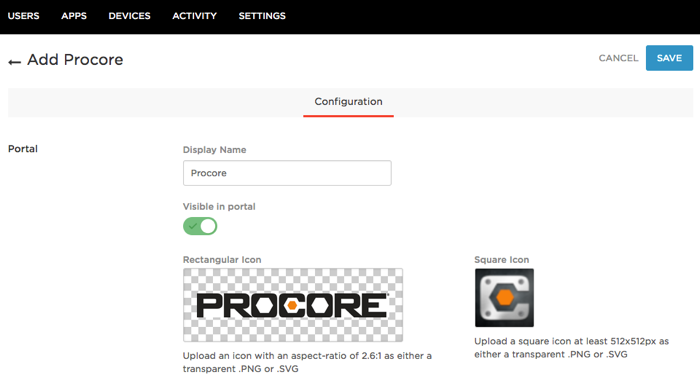
- Verify the following:
- Display Name. Verify that the entry reads "Procore".
- Visible in Portal. A GREEN checkmark should appear.
- Rectangular Icon. The Procore logo should appear.
- Square Icon. The Procore icon should appear.
- Click Save.
A green banner appears to confirm that the app was successfully added. A row of tabs appears in your apps new page.
Step 2: Configure Procore with the SSO Settings from OneLogin
- In the new app's page, click the SSO tab.
This tab provides you with access to all of OneLogin's SSO Settings. Later, you will add the settings that you copy on this page to Procore's Company Admin tool. - In the X.509 Certificate box, click View Details.
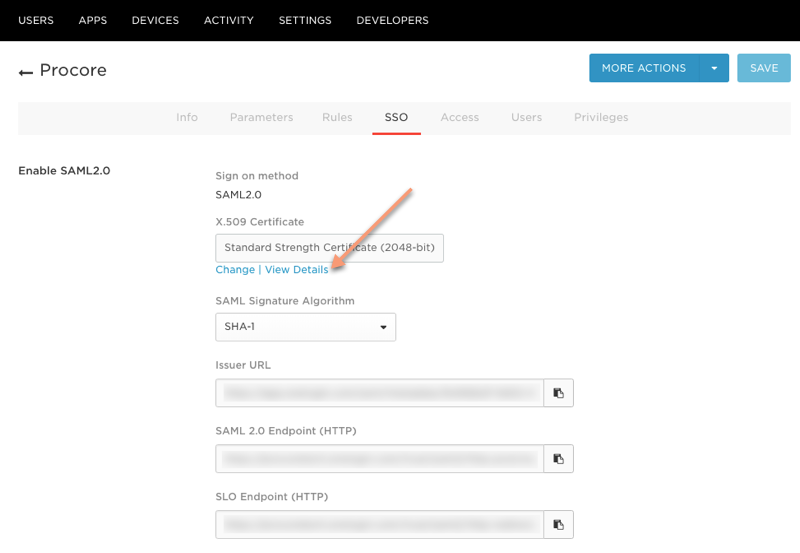
This opens a page showing all the certificate details. - In the top-right corner of the X.509 Certificate box, click Copy to Clipboard.
This copies the X.509 certificate to your web browser's clipboard.
Important! When using the OneLogin website, you might want to paste the items you copy into a Notepad document, to ensure that the Copy to Clipboard command worked as expected. When the copy command is successful, the browser will display a 'Copied' tooltip like the one illustrated below. If the copy command does NOT work in your browser version, simply place your mouse cursor in the text field the copy all the text (e.g., press CTRL+C in Windows or CMD+C on a Mac).
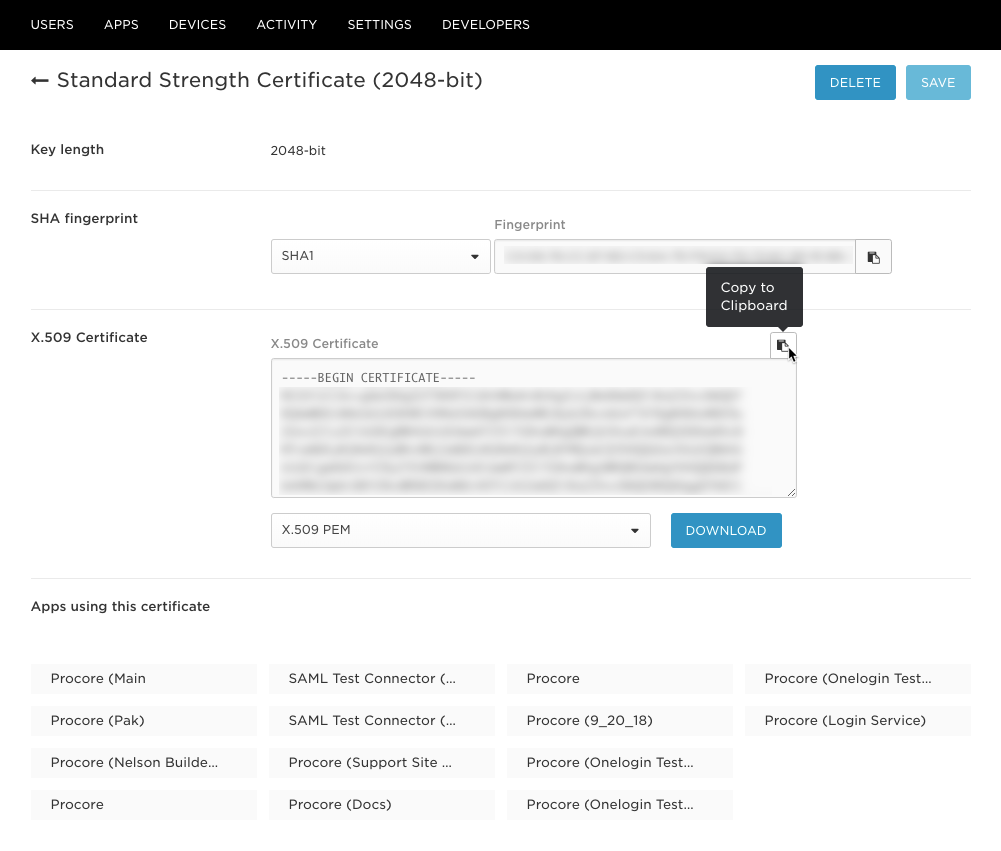
- Format the Certificate
- Open a new browser tab. Then visit this link:
https://www.samltool.com/format_x509cert.php
This opens the Format an X509 Certificate page, which is owned by OneLogin. - Paste the X.509 certificate that you copied into the X.509 Cert field, as shown below.
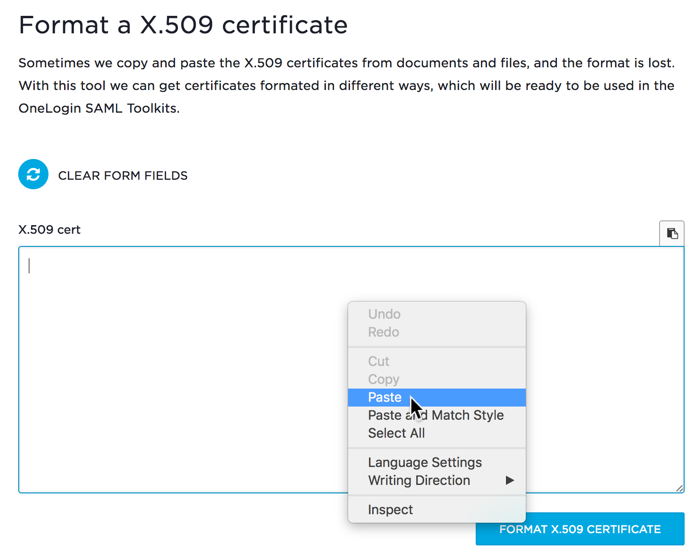
- Click Format X.509 Certificate.
The OneLogin tool automatically formats the certificate in two ways -- with the header or with the string. - Scroll to X.509 Cert in String Format box at the bottom of the page.
- Click the Copy to Clipboard icon in the top-right corner of the X.509 Cert In String Format box.

- Open a new browser tab. Then visit this link:
- Configure Your Company's Procore Web Application with the OneLogin SSO Settings
- Log in to the Procore web application. See Log in to Procore Web.
Note: You must login with a user account that has been assigned Procore Administrator permissions. - Navigate to the company's Admin tool.
- Under Administrative Settings, click Single Sign On Configuration.
- Paste the information from OneLogin into Procore as follows:
Copy this information from OneLogin… Paste it into this field in Procore… Issuer URL
Copy the Issuer URL from the SSO tab for the Procore app in OneLogin.Single Sign On Issuer URL
Paste the Issuer URL into this field.


SAML 2.0 Endpoint (HTTP)
Copy the SAML 2.0 Endpoint (HTTP) from the SSO tab for the Procore app.Single Sign On Target Url
Paste the SAML 2.0 Endpoint (HTTP) into this field.

X.509 Cert in String Format
This should still be in your clipboard memory.Single Sign On x509 Certificate
Paste the certificate in the string format into this field.

- In Procore, scroll to the bottom of the page and click Save Changes.
- Next, reach out to your company's Procore point of contact or contact Procore Support to request that they enter the domains you want to target for authentication via SSO. Procore must enter these domains on your behalf.
- Once the domain(s) have been entered by Procore, take the final steps to enable SSO for your company:
- Mark the Enable Single Sign On box in Procore's SSO configuration settings.
- Select Allow Password Login to enable an IdP-initiated flow.
- Click Save.
- Log in to the Procore web application. See Log in to Procore Web.
- Format the Certificate
Authentication via the configured SSO method will become active immediately after saving the final completed configuration.
PROCORE SUPPORT: INTERNAL NOTE
Perform the steps below when notified by the Procore Administrator that the SSO configuration is complete:
- When notified by the Procore Administrator that the SSO configuration is complete, please be sure that the following fields are filled out:
- Single Sign On Issuer URL
- Single Sign On Target URL
- Single Sign On x509 Certificate
- Once confirmed, the domain(s) will need to be filled out by one of the following:
- Justin Pahl or the #cs-sso-gurus Slack channel
- In the event the above people aren't available, reach out in Slack via #squad-identity.
- Once done, the client will be able to check the box for 'Enable Single Sign On'. When they do, they will see the following two options: ' Allow Password Login' (refers to IdP-Initiated) and 'Service Provider Forward' (refers to SP-initiated). We typically recommend they try 'Allow Password Login' first to test the connection.


